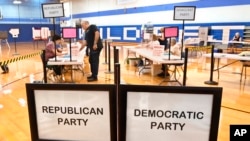Top U.S. officials are ramping up efforts to convince Americans that the upcoming midterm elections will be safe and that the results can be trusted.
The director of the U.S. Cybersecurity and Information Security Agency (CISA) Thursday became the latest official voice to join the chorus, while noting the election threat environment is “more complex than it has ever been.”
“We are not aware of any specific or credible threats to compromise or disrupt election infrastructure,” CISA’s Jen Easterly told reporters during a virtual briefing.
Easterly’s comments followed similar assurances in recent days from the White House and the head of U.S. Cyber Command, who told an audience in Washington on Tuesday that “we are seeing no significant indications of attacks that are being planned right now.”
But with just three weeks until U.S. voters head to the polls, the challenge for election officials is daunting.
Questioning elections’ legitimacy
A December 2021 poll by the University of Massachusetts at Amherst, with a margin of error of 3.1%, found that more than 20% of respondents believed the outcome of the 2020 U.S. presidential election was “definitely not legitimate.”
A YouGov poll of 1,500 U.S. citizens conducted in July found 24% of those surveyed had no confidence the 2020 U.S. presidential election was held fairly.
When asked about their confidence that the 2022 midterms will be held fairly, 13% said “None at all," while 19% said “Only a little.”
The YouGov poll’s margin of error was +/- 2.7%.
A recent analysis by The Washington Post found more than 290 political candidates who deny the results of the 2020 election will be on the ballot in November, with election deniers running for office in 48 of the 50 U.S. states.
A key driver of such doubt has been former President Donald Trump, who continues to claim that the 2020 election was stolen from him.
Trump and his political allies, however, have lost more than 50 lawsuits in state and federal courts alleging fraud, but his followers and others still continue to challenge the credibility of U.S. elections.
State and local election officials have sought to push back, though they say it is taking a toll.
“This false narrative is still disrupting our lives,” Deborah Scroggin, the director of the Oregon Elections Division at the Oregon secretary of state’s office, wrote earlier this month in The Oregonian.
“Throughout the state, local elections officials are spending countless hours responding to election deniers,” Scroggin added. “We’ve seen a flood of public records requests and legal threats during critical stages of preparing for November. These are attempts to delay and disrupt our work.”
Still, Meagan Wolfe, the president of the National Association of State Election Directors (NASED), remains optimistic.
“This has been a challenging few years,” Wolfe, who also serves as the Wisconsin Elections Commission administrator, told reporters during CISA’s briefing Thursday. “But I feel confident that election officials will rise to the occasion, as we've seen them do time and time again.”
Increase in election-related threats
The challenge extends beyond a lack of confidence among a significant minority of Americans. The lingering doubts about the trustworthiness of U.S. elections has led to threats.
Officials with the U.S. Justice Department and the Federal Bureau of Investigation say they have received more than 1,000 reports of election-related threats since June 2021. To date, 11% of the cases have required additional investigation, resulting so far in at least six arrests and one conviction.
The U.S. Department of Homeland Security warned in its most recent National Terrorism Advisory System (NTAS) bulletin that the midterm elections could serve as a rallying point for domestic extremists bent on violence.
Pressed on rumors that armed Americans may try to gather at polling places to oversee or secure the vote, CISA’s Easterly said Thursday, “We have not seen any specific or credible information about those types of threats at this point in time.”
However, Easterly and other officials said CISA and its partners across government are paying close attention.
“We have a very tight partnership with state and local election officials if there's any of that information that's picked up, so we can get that to them to ensure that they're aware of it,” she said.
CISA is also working to empower state and local election officials so they know what to do in case they are confronted with situations that could escalate to violence, going as far as to post a training video on its YouTube channels.
CISA has also been working to combat the constant din of disinformation, collaborating with groups like the National Association of Secretaries of State to promote a trusted sources initiative called #TrustedInfo2022.
“We know from what we've learned that the most impactful way of combating disinformation is to empower local election officials as the trusted voices within their communities to help voters get the accurate information they need to have confidence when they go to the ballot box,” Easterly said.







